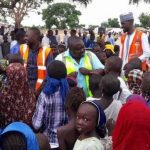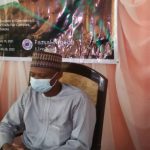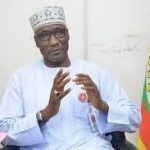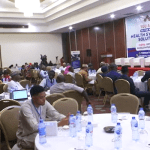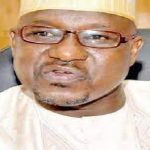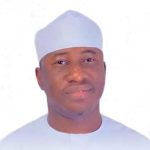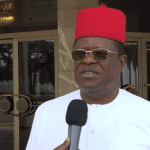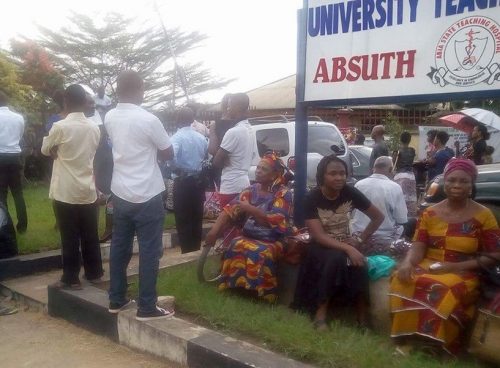The Minister of Health, Isaac Adewole, disclosed this at the commemoration of the 2017 World Humanitarian Day in Abuja.
Mr. Adewole said the money was spent on purchasing relief materials, drugs, medical consumables, hospital equipment and on capacity building and deployment of volunteer health workers.
He said the ministry adopted a two-pronged approach to provide basic medical services to the affected population and strengthen the pillars of the health system in the region.
Mr. Adewole said the ministry has responded to humanitarian crises in the country by strengthening the Special Project Department and appointing a Substantive Director to coordinate health-related response to the crises.
He described the humanitarian crisis in the North-east as unprecedented and protracted, with
Borno State as the epicentre.
The minister said government developed the North East Health Sector Humanitarian Crisis Response Strategic Plan (NEHSHRSP) with the primary objective to reposition the health system in the region.
Mr. Adewole said a Rapid Response Team developed a six-month health and nutritional plan to address the rapid decline in health and nutritional indices in Borno State.
He added that the plan was implemented and is now being extended by another six months due to the giant strides it achieved such as increased access to quality healthcare by communities.
The achievements of the project, according to the minister, include diagnosis and treatment of about 15,000 cases of malaria in host communities and IDP camps and provision of family planning commodities to about 4000 women in host communities and IDP camps.
He said government through the project also provided quality ante-natal care to 14,355 women and delivered 1,100 babies through skilled birth attendants in host communities and IDP camps.
The minister thanked all those involved in the project, including the Nigerian security agencies.
Mr. Adewole also prayed for the repose of the souls of participants who lost their lives during the exercise, one of whom was a staff of the ministry, Mustapha Modu.
The Minister of Health, Isaac Adewole, disclosed this at the commemoration of the 2017 World Humanitarian Day in Abuja.
Mr. Adewole said the money was spent on purchasing relief materials, drugs, medical consumables, hospital equipment and on capacity building and deployment of volunteer health workers.
He said the ministry adopted a two-pronged approach to provide basic medical services to the affected population and strengthen the pillars of the health system in the region.
Mr. Adewole said the ministry has responded to humanitarian crises in the country by strengthening the Special Project Department and appointing a Substantive Director to coordinate health-related response to the crises.
He described the humanitarian crisis in the North-east as unprecedented and protracted, with
Borno State as the epicentre.
The minister said government developed the North East Health Sector Humanitarian Crisis Response Strategic Plan (NEHSHRSP) with the primary objective to reposition the health system in the region.
Mr. Adewole said a Rapid Response Team developed a six-month health and nutritional plan to address the rapid decline in health and nutritional indices in Borno State.
He added that the plan was implemented and is now being extended by another six months due to the giant strides it achieved such as increased access to quality healthcare by communities.
The achievements of the project, according to the minister, include diagnosis and treatment of about 15,000 cases of malaria in host communities and IDP camps and provision of family planning commodities to about 4000 women in host communities and IDP camps.
He said government through the project also provided quality ante-natal care to 14,355 women and delivered 1,100 babies through skilled birth attendants in host communities and IDP camps.
The minister thanked all those involved in the project, including the Nigerian security agencies.
Mr. Adewole also prayed for the repose of the souls of participants who lost their lives during the exercise, one of whom was a staff of the ministry, Mustapha Modu.
The Minister of Health, Isaac Adewole, disclosed this at the commemoration of the 2017 World Humanitarian Day in Abuja.
Mr. Adewole said the money was spent on purchasing relief materials, drugs, medical consumables, hospital equipment and on capacity building and deployment of volunteer health workers.
He said the ministry adopted a two-pronged approach to provide basic medical services to the affected population and strengthen the pillars of the health system in the region.
Mr. Adewole said the ministry has responded to humanitarian crises in the country by strengthening the Special Project Department and appointing a Substantive Director to coordinate health-related response to the crises.
He described the humanitarian crisis in the North-east as unprecedented and protracted, with
Borno State as the epicentre.
The minister said government developed the North East Health Sector Humanitarian Crisis Response Strategic Plan (NEHSHRSP) with the primary objective to reposition the health system in the region.
Mr. Adewole said a Rapid Response Team developed a six-month health and nutritional plan to address the rapid decline in health and nutritional indices in Borno State.
He added that the plan was implemented and is now being extended by another six months due to the giant strides it achieved such as increased access to quality healthcare by communities.
The achievements of the project, according to the minister, include diagnosis and treatment of about 15,000 cases of malaria in host communities and IDP camps and provision of family planning commodities to about 4000 women in host communities and IDP camps.
He said government through the project also provided quality ante-natal care to 14,355 women and delivered 1,100 babies through skilled birth attendants in host communities and IDP camps.
The minister thanked all those involved in the project, including the Nigerian security agencies.
Mr. Adewole also prayed for the repose of the souls of participants who lost their lives during the exercise, one of whom was a staff of the ministry, Mustapha Modu.
The Minister of Health, Isaac Adewole, disclosed this at the commemoration of the 2017 World Humanitarian Day in Abuja.
Mr. Adewole said the money was spent on purchasing relief materials, drugs, medical consumables, hospital equipment and on capacity building and deployment of volunteer health workers.
He said the ministry adopted a two-pronged approach to provide basic medical services to the affected population and strengthen the pillars of the health system in the region.
Mr. Adewole said the ministry has responded to humanitarian crises in the country by strengthening the Special Project Department and appointing a Substantive Director to coordinate health-related response to the crises.
He described the humanitarian crisis in the North-east as unprecedented and protracted, with
Borno State as the epicentre.
The minister said government developed the North East Health Sector Humanitarian Crisis Response Strategic Plan (NEHSHRSP) with the primary objective to reposition the health system in the region.
Mr. Adewole said a Rapid Response Team developed a six-month health and nutritional plan to address the rapid decline in health and nutritional indices in Borno State.
He added that the plan was implemented and is now being extended by another six months due to the giant strides it achieved such as increased access to quality healthcare by communities.
The achievements of the project, according to the minister, include diagnosis and treatment of about 15,000 cases of malaria in host communities and IDP camps and provision of family planning commodities to about 4000 women in host communities and IDP camps.
He said government through the project also provided quality ante-natal care to 14,355 women and delivered 1,100 babies through skilled birth attendants in host communities and IDP camps.
The minister thanked all those involved in the project, including the Nigerian security agencies.
Mr. Adewole also prayed for the repose of the souls of participants who lost their lives during the exercise, one of whom was a staff of the ministry, Mustapha Modu.
The Minister of Health, Isaac Adewole, disclosed this at the commemoration of the 2017 World Humanitarian Day in Abuja.
Mr. Adewole said the money was spent on purchasing relief materials, drugs, medical consumables, hospital equipment and on capacity building and deployment of volunteer health workers.
He said the ministry adopted a two-pronged approach to provide basic medical services to the affected population and strengthen the pillars of the health system in the region.
Mr. Adewole said the ministry has responded to humanitarian crises in the country by strengthening the Special Project Department and appointing a Substantive Director to coordinate health-related response to the crises.
He described the humanitarian crisis in the North-east as unprecedented and protracted, with
Borno State as the epicentre.
The minister said government developed the North East Health Sector Humanitarian Crisis Response Strategic Plan (NEHSHRSP) with the primary objective to reposition the health system in the region.
Mr. Adewole said a Rapid Response Team developed a six-month health and nutritional plan to address the rapid decline in health and nutritional indices in Borno State.
He added that the plan was implemented and is now being extended by another six months due to the giant strides it achieved such as increased access to quality healthcare by communities.
The achievements of the project, according to the minister, include diagnosis and treatment of about 15,000 cases of malaria in host communities and IDP camps and provision of family planning commodities to about 4000 women in host communities and IDP camps.
He said government through the project also provided quality ante-natal care to 14,355 women and delivered 1,100 babies through skilled birth attendants in host communities and IDP camps.
The minister thanked all those involved in the project, including the Nigerian security agencies.
Mr. Adewole also prayed for the repose of the souls of participants who lost their lives during the exercise, one of whom was a staff of the ministry, Mustapha Modu.
The Minister of Health, Isaac Adewole, disclosed this at the commemoration of the 2017 World Humanitarian Day in Abuja.
Mr. Adewole said the money was spent on purchasing relief materials, drugs, medical consumables, hospital equipment and on capacity building and deployment of volunteer health workers.
He said the ministry adopted a two-pronged approach to provide basic medical services to the affected population and strengthen the pillars of the health system in the region.
Mr. Adewole said the ministry has responded to humanitarian crises in the country by strengthening the Special Project Department and appointing a Substantive Director to coordinate health-related response to the crises.
He described the humanitarian crisis in the North-east as unprecedented and protracted, with
Borno State as the epicentre.
The minister said government developed the North East Health Sector Humanitarian Crisis Response Strategic Plan (NEHSHRSP) with the primary objective to reposition the health system in the region.
Mr. Adewole said a Rapid Response Team developed a six-month health and nutritional plan to address the rapid decline in health and nutritional indices in Borno State.
He added that the plan was implemented and is now being extended by another six months due to the giant strides it achieved such as increased access to quality healthcare by communities.
The achievements of the project, according to the minister, include diagnosis and treatment of about 15,000 cases of malaria in host communities and IDP camps and provision of family planning commodities to about 4000 women in host communities and IDP camps.
He said government through the project also provided quality ante-natal care to 14,355 women and delivered 1,100 babies through skilled birth attendants in host communities and IDP camps.
The minister thanked all those involved in the project, including the Nigerian security agencies.
Mr. Adewole also prayed for the repose of the souls of participants who lost their lives during the exercise, one of whom was a staff of the ministry, Mustapha Modu.
The Minister of Health, Isaac Adewole, disclosed this at the commemoration of the 2017 World Humanitarian Day in Abuja.
Mr. Adewole said the money was spent on purchasing relief materials, drugs, medical consumables, hospital equipment and on capacity building and deployment of volunteer health workers.
He said the ministry adopted a two-pronged approach to provide basic medical services to the affected population and strengthen the pillars of the health system in the region.
Mr. Adewole said the ministry has responded to humanitarian crises in the country by strengthening the Special Project Department and appointing a Substantive Director to coordinate health-related response to the crises.
He described the humanitarian crisis in the North-east as unprecedented and protracted, with
Borno State as the epicentre.
The minister said government developed the North East Health Sector Humanitarian Crisis Response Strategic Plan (NEHSHRSP) with the primary objective to reposition the health system in the region.
Mr. Adewole said a Rapid Response Team developed a six-month health and nutritional plan to address the rapid decline in health and nutritional indices in Borno State.
He added that the plan was implemented and is now being extended by another six months due to the giant strides it achieved such as increased access to quality healthcare by communities.
The achievements of the project, according to the minister, include diagnosis and treatment of about 15,000 cases of malaria in host communities and IDP camps and provision of family planning commodities to about 4000 women in host communities and IDP camps.
He said government through the project also provided quality ante-natal care to 14,355 women and delivered 1,100 babies through skilled birth attendants in host communities and IDP camps.
The minister thanked all those involved in the project, including the Nigerian security agencies.
Mr. Adewole also prayed for the repose of the souls of participants who lost their lives during the exercise, one of whom was a staff of the ministry, Mustapha Modu.
The Minister of Health, Isaac Adewole, disclosed this at the commemoration of the 2017 World Humanitarian Day in Abuja.
Mr. Adewole said the money was spent on purchasing relief materials, drugs, medical consumables, hospital equipment and on capacity building and deployment of volunteer health workers.
He said the ministry adopted a two-pronged approach to provide basic medical services to the affected population and strengthen the pillars of the health system in the region.
Mr. Adewole said the ministry has responded to humanitarian crises in the country by strengthening the Special Project Department and appointing a Substantive Director to coordinate health-related response to the crises.
He described the humanitarian crisis in the North-east as unprecedented and protracted, with
Borno State as the epicentre.
The minister said government developed the North East Health Sector Humanitarian Crisis Response Strategic Plan (NEHSHRSP) with the primary objective to reposition the health system in the region.
Mr. Adewole said a Rapid Response Team developed a six-month health and nutritional plan to address the rapid decline in health and nutritional indices in Borno State.
He added that the plan was implemented and is now being extended by another six months due to the giant strides it achieved such as increased access to quality healthcare by communities.
The achievements of the project, according to the minister, include diagnosis and treatment of about 15,000 cases of malaria in host communities and IDP camps and provision of family planning commodities to about 4000 women in host communities and IDP camps.
He said government through the project also provided quality ante-natal care to 14,355 women and delivered 1,100 babies through skilled birth attendants in host communities and IDP camps.
The minister thanked all those involved in the project, including the Nigerian security agencies.
Mr. Adewole also prayed for the repose of the souls of participants who lost their lives during the exercise, one of whom was a staff of the ministry, Mustapha Modu.

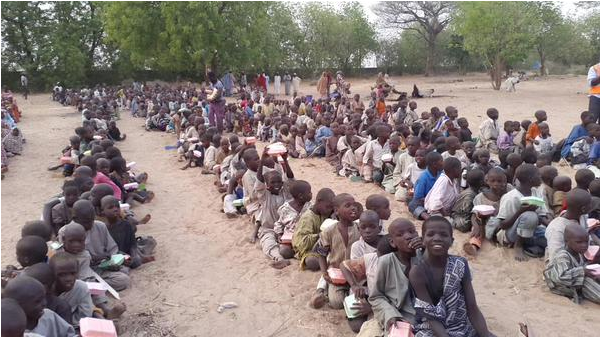
 The Nigerian Government through the Ministry of Health has spent over N 4 billion on the
The Nigerian Government through the Ministry of Health has spent over N 4 billion on the
